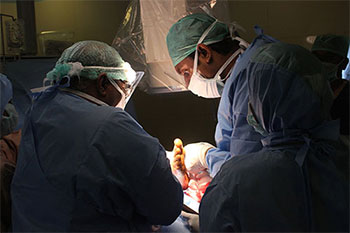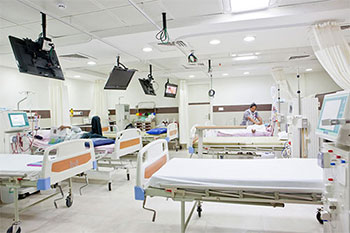Specialities
Fracture Treatment in Chennai – Types and Technology

Orthopaedic injuries can be serious and traumatic, requiring immediate care and possibly surgeries. Accidents happen, even to the most careful people and therefore, providing immediate and appropriate management of trauma care contributes very significantly to the long, short or intermediate term results. At The Kauvery Institute of Orthopaedics and Neurosciences, we provide exceptional care in treating and managing all injuries starting from simple bone fractures to complex injuries to the musculoskeletal system.
Commonly treated trauma injuries include but are not limited to:
Our round the clock accident and trauma management services offer the highest level of all possible care to the seriously injured patients. The Kauvery Institute Orthopaedic Accident and Trauma care team of medical experts, include trauma/acute care surgeons, neurosurgeons, vascular surgeons, plastic surgeons and other physicians who address traumatic injuries. This collection of expertise ensures that patients receive the best possible care, whether treatments for bone fractures or complications due to trauma. This helps us to help maximize the recovery of the patient and speed up their return to normal activities.
1. The most advanced medical technology
2. A constant upgrade of an array of diagnostic devices and orthopaedic instruments

We treat patients, who are the victims of a fresh auto accident or are sufferers of injuries from long term after effects of an auto accidents, with the use of the latest orthopaedic techniques.
An open fracture (bone breaks in a way that the fragments of bone stick out through the skin or the wound is too deep) requires immediate bone fracture surgery since it can get infected. Our trauma care experts initiate quick efforts to decontaminate the broken ends of the bone(s) to stabilize the patient and expeditiously help the healing process.
Pelvic and acetabulum (cup-shaped socket of the hip) fractures are severe, and depending on the displacement or instability of the hip, our team of orthopaedic surgeons may perform surgery. The surgery will be performed to align the cartilage surface, to remove any debris from the joint and consequently to restore stability to the hip.
In some case mal-union of fractures or non-union of fractures can occur. When a bone does not heal within 6 to 9 months, after a fracture, it is said to be a non-union. In cases of mal-union, the bone heals irregularly in an imperfect position. In both cases it causes pain and allows limited mobility for months or even for years after the original injury. In this case, an orthopedist will evaluate the condition, and a correction surgery can be performed to restore the pre-fracture function as much as possible. We have some of the top bone fracture Surgery specialists in Chennai who are experienced in these surgeries.
Regardless of the nature of trauma to your musculoskeletal system, we can assure you that at The Kauvery Institute of Orthopaedic and Neurosciences, you will get the best bone fracture surgery treatment in Chennai. We endeavour to provide the best care, utilizing our collective medical acumen, state-of-the-art technology, and international medication safety care to restore our patients’ quality of life.
FAQ
When the stress or strain suffered by a bone exceeds what it can bear, the bone cracks or splits, which is called a fracture. This can occur due to trauma or injury from sporting activity, motor vehicle accidents, a violent collision with stationery objects, moving objects or people, nasty falls from heights and joint overuse or abuse. In older people, osteoporosis can also cause weak and brittle bones that fracture easily with simple falls.
If the bone has just cracked and there is no displacement of the segments, there is moderate pain along with a little swelling. In case of displacements, there can be acute pain, redness, swelling, tenderness and limited movement or range of motion in the affected part. In the case of open fractures where the broken bone is piercing through the skin, there can be bleeding and soreness at the spot.
Simple fractures which involve a smaller bone and two segments, heal within 6 weeks. Complex fractures which involve larger bones and multiple fragments, take anywhere from 3 months to 9 months to heal completely.
If treatment for a fracture is delayed, there can be bone death, also called avascular necrosis. This happens as the bone does not get its required blood supply. Another possibility is bone marrow infection, also called osteomyelitis. During healing, the bone can heal in the wrong position causing what is known as malunion. In children who have suffered a fracture, the normal development of the bone can be affected causing an abnormality or deformity as they grow up.
